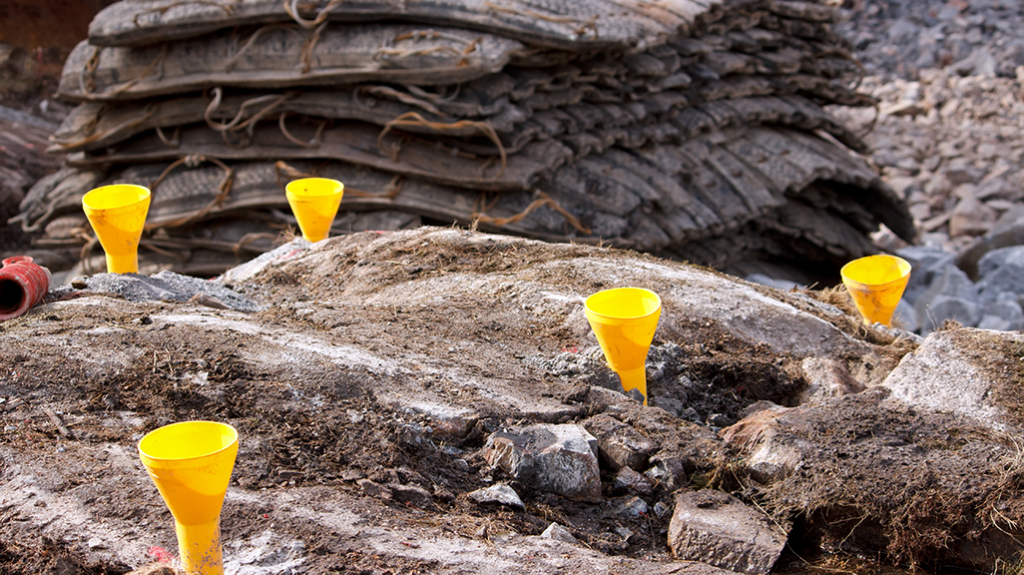The Manitoba Construction Sector Council (MCSC) is pushing to change blaster training in Western Canada by promoting its Blaster-in-Training program aimed at eliminating what it calls inconsistencies in one of the most dangerous industries.
Blasting demolition work ranges from building and infrastructure implosions to clearing rock faces or slides related to highways, blasting tunnels and underground parking areas, or, creating a pipeline path.
But, it has been a frustrating process, said MCSC executive director Carol Paul, who has been trying to get the word out to other provinces over the past year on the MCSC program, as well as its black-hole drilling training program which saw the MCSC receive $1.3 million in federal funding to purchase four drilling simulators with the last unit on arriving in March. The programs can be used in other provinces, she said to ensure those entering the industry have a sound foundation in blasting and drilling techniques.
“The problem is no real training programs for blasters and drillers,” said Carol Paul, MCSC executive director. The MCSC training programs can provide much needed entry-level paths to skilled jobs, which rely on company mentors. In the case of a blaster-in-training, the program ensures that the person has the knowledge to write a provincial exam for certification.
“The drillers and blasters were learning from mentors but there was a lack of consistency and best practices. The bad habits were being passed down,” she said, explaining why the program was developed. Also, “we were losing good trainers” as aging baby-boomers depart with expertise, she said. There is no industry oversight for drillers and while blaster must certify in each province and keep up that certification. Usually a blaster will have both skills.
“Drilling is actually more dangerous,” she said as any company or individual can buying drilling equipment. When operators do not have proper training on the top-heavy machines, they can topple.
Paul maintains that the blaster-in-training program does not take away from the existing mentorship relationship common in the industry today but is a complement. The program can be run by companies, organizations, or taken by an individual but the caveat is that there must work with a provincially certified blaster. Course material includes videos, review questions, case studies, worksite documents, and each of the 10 modules five worksite assignments designed for new learning and feedback from the mentor, an experienced blaster.
Danny Klein, executive members of the B.C. construction sector of LiUNA (Local 1611) said there he is unaware of any apprenticeship programs for blasting as it is considered a skill and not a designated trade. But, it is also a challenging skill to teach. “It is a tough job and a stressful one where if you make a mistake, it can cost lives.”
B.C.’s Pacific Blasting & Drilling general manager Lewis Clarke said blasting should be a trade and recognized across Canada. It has been looked at within the industry to develop a more structured training program but “it takes a lot of money and time.” But, considering the technical skills needed to perform in a variety of blasting jobs, “it boggles my mind” that it isn’t a Red Seal trade, he said. Clarke, like many others, was unaware of the MCSC program.
Gaining entry to the industry can be hit and miss. “You pretty well needed to know someone to get into the industry,” said B.C. Metro Blasting Inc. owner Gary Anderson, who started in 1973 as a young man and learned from a mentor. Today he mentors four nephews, a son-in-law and friends of the family who wanted into the industry, bringing them along until they get certified and increasing the complexity of jobs as their skill level increases. His expertise, ranging over half a century, has made the company a target of poaching.
B.C.’s TNT Explosives owner Craig Ramm, another industry veteran who has brought forward new entrants now working in the industry, said that in his company, individuals enter as labourer and advance through the ranks helping blasters until they gain enough proficiency to tackle the provincial exam, which requires a letter of recommendation from the employer.
Ramm admits it is not a perfect system; not all labourers want to be blasters and not all would-be blasters can pass the provincial exam. But blasting can be financially rewarding — prior to starting his company, Ramm was earning $80 an hour as an expert blaster.
Shari Charlton, safety coordinator for McCaw’s Drilling and Blasting, which works mainly in B.C. and Alberta but also throughout Canada, said a blasting candidate arriving at her company after taking a theory course is not a sure shoo-in. “Anyone can teach the mechanics of blasting,” she says, but on-site performance is key and mentoring exists within the company.
Charlton said it is difficult to establish a national standard for blasters. “The legislation for handling explosives is slightly different in each province,” she said. But, the federal government did bring in a national requirement two years ago that all those attempting to gain certification as a blaster had to pass a criminal record check.
Manitoba industry members that have supported the development of the blasting curriculum offer the training, including national suppliers Austin Powder and Epiroc, which supplies rock excavation equipment
The Blaster-in-Training program is designed to allow new entrants to train at their own pace over six to 18 months. Or, it can be used by companies as a refresher course for blasters, who have to recertify. (The driller’s program has been taught in an eight-week course to Penn-co employees through Thompson’s University College of the North).
Paul said she is particularly interesting in working with companies or organizations that want to train Indigenous people in Western Canada. The simulators have trailers that can travel throughout Western Canada.
The MCSC courses are offered on a not-for-profit basis, she said.











Recent Comments
comments for this post are closed